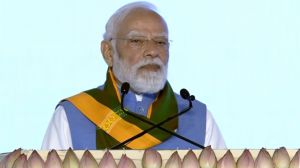Hardik Patel, Jignesh Mevani, Gopal Italia: Bill to amend Factories Act allowing 12-hour workday sees heated debate among Gujarat’s young MLAs
The Bill was passed in the Assembly by a majority vote following a marathon debate over its provisions during which members of Opposition Congress and the AAP opposed it with an MLA of the latter even tearing a copy of the Bill in the House.
 Newly elected AAP MLA Italia opposed the Bill, questioning the urgency to bring it through an ordinance in July.
Newly elected AAP MLA Italia opposed the Bill, questioning the urgency to bring it through an ordinance in July.
The bill amending The Factories Act, 1948, to raise the working hours from nine to 12 and allow women to work in night shifts, among other provisions, was passed by majority in the Gujarat Assembly on Wednesday even as the younger Opposition MLAs like Congress’s Jignesh Mevani and Aam Aadmi Party’s (AAP) Gopal Italia opposed it while the BJP’s Hardik Patel spoke in its support.
Hailing The Factories (Gujarat Amendment) Bill, 2025, that proposes to replace the The Factories (Gujarat Amendment) Ordinance that was promulgated by the state government in July this year to amend the Factories Act, 1948, as “historic”, Industries Minister Balvantsinh Rajput said, “This Bill is not just a legal amendment. It is a statement of Gujarat about its intention. Gujarat is ready for the future…This important Bill will protect the workers’ interests while giving an impetus to the industrial activities.”
The Bill was passed in the Assembly by a majority vote following a marathon debate over its provisions during which members of Opposition Congress and the AAP opposed it with an MLA of the latter even tearing a copy of the Bill in the House.
The Bill proposes to increase the daily working hours to 12 with a cap of 48 hours in a week with a condition of written consent from the worker. As per the Bill, if a worker works for 48 hours in four days, then he will be entitled to two days’ paid leave in the week.
“Rest of the time, the worker can spend with his family,” Rajput said.
The bill provides for overtime wages at twice the ordinary rate and raises the quarterly cap on overtime hours from the existing 75 to 125, subject to the worker’s written consent.
Also, the Bill proposes to allow women to work in factories between 7 pm and 6 am with 16 conditions that includes a written consent of the woman worker. Rajput said that this provides an opportunity to the worker, if she is willing and capable, to earn more.
Opposing the bill, Mevani said, “Following a long struggle of labourers, humankind decided the working hours: eight hours of labour, eight hours of recreation and eight hours of sleep.” He said that even Dr B R Ambedkar had said that a labourer should not be made to work for more than eight hours in Indian geographical condition.
“I say with folded hands, don’t bring this law,” the Congress MLA from Vadgam said.
Referring to the clause of written consent of the labourer, Mevani pointed out that India is a labour surplus country. He said that no labourer will be in a position to say no to extended working hours lest they get retrenched. If the move is challenged in labour court, there won’t be a decision on it for 15 years, he added.
Mevani said that labourers who toil more than their working hours do not get overtime pay. “So, if the 12-hour working day comes on record, the labourers will be made to work for 13-14 hours. They will be left with no (other) life,” Mevani said.
Opposing the Bill, he said, “This will not bring repute to Gujarat. There are other ways to achieve economic upliftment. Do land reforms. Allot land to landless people of Gujarat. Erect GIDC units where they do not exist… I do not believe that industrial growth will get impetus by amending Factories Act and making labourers work for 12 hours.”
Congress’s Shailesh Parmar said it is not clear if the government has brought the Bill “out of love for the industrialists or out of feelings for labourers”. He said the Congress would have supported the Bill if the working hours were reduced to seven in a day.
Newly elected AAP MLA Italia opposed the Bill, questioning the urgency to bring it through an ordinance in July.
“Did labour organisations do any agitation? Did they strike? Did the leaders of labourers put up a demand before the government? There is no representation, no agitation from the labourers…the legislation came through an ordinance. It means that this law has not been brought for labourers, but in support of those who exploit them,” he said.
On the provision of consent of the labourer, Italia said, “Now, if a labourer does not give consent (to work for 12 hours), where is the clause for job protection that the factory owner will not remove him? There is no meaning of such a consent.”
On the double wages for overtime, Italia, a former police constable, said that police jawans worked for long hours without any overtime.
Italia made several suggestions in the Bill like having a punching machine at the factory to decide working hours of the labourer and a concrete mechanism to ensure that the consent clause does not remain a mere formality. He asked for the Bill to be sent to a select committee.
AAP MLA Umesh Makwana, too, opposed the Bill on various points and tore it to register his protest while pointing out that most of the labourers belong to backward classes of the society.
First-time MLA from Viramgam, BJP’s Hardik Patel, though, said that it was necessary that women workers get a chance to work equally like men.
Patel said, “Women empowerment will be meaningful only when women labourers get a chance to work equally like their male counterparts. And therefore, this amendment is necessary.”
Patel said it is voluntary for a woman labourer to work in night hours. He emphasised that without a woman’s consent, she won’t be working in night hours.
Former Congress leader and now BJP MLA from Porbandar, Arjun Modhwadia, supported the bill, saying it respected women. “In current times, discrimination cannot be done to anybody. If men can work, so can women. There is no doubt…This Bill has been brought in to give respect to women,” he added.
Another BJP MLA from Junagadh, Sanjay Koradiya, said that with increased hours of overtime, the Bill will be very important for the labourers to make their family financially capable.
Godhra MLA C K Raulji said that even educated people work overtime for the welfare and upliftment of their family.
Rejecting the opposition claim that the 12-hour work day will lead to exploitation, Modhwadia said, “The 12 hours (provision) is not compulsory. Those who want to do overtime, may do it.”
Modhwadia further said, “This Bill is as per policy and as per international standards. It is also in line with the sustainable development goal that we are going to achieve.”
In his reply on the debate, Rajput said that the provision of the 12-hour shift is to match with the latest technology in industries. He said that the state government will give permission to have a 12-hour shift to only those classes/groups of factories, which use modern technology requiring 12-hour shifts.
“Nobody spreads a misunderstanding (on that)…(If) we give permission for a 12-hour shift, we will also decide how much time it will be. It will not be forever. If we realise that proper work is not being done and injustice is being done to workers, then we have the power to withdraw (the permission),” he added.







